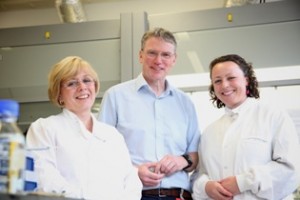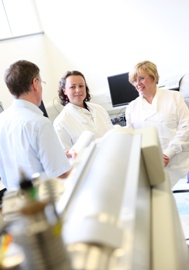 Catherine McKinnell, MP for Newcastle Upon Tyne North and Mary Glindon, MP for North Tyneside, visited the Newcastle Cancer Centre at the Northern Institute for Cancer Research last week (Friday 13 May), where they witnessed the range of groundbreaking scientific research being carried out there.
Catherine McKinnell, MP for Newcastle Upon Tyne North and Mary Glindon, MP for North Tyneside, visited the Newcastle Cancer Centre at the Northern Institute for Cancer Research last week (Friday 13 May), where they witnessed the range of groundbreaking scientific research being carried out there.
In 2009 Newcastle became one of the first places to join a unique chain of cancer research Centres in the UK putting the city at the forefront of cancer research and bringing benefits to patients across the North East, and in both their constituencies.
The Centre, based at the Northern Institute for Cancer Research at Newcastle University, is jointly funded by three charities – Cancer Research UK, Leukaemia & Lymphoma Research and the North of England Children’s Cancer Research Fund.
Thanks to the generosity of its supporters, Cancer Research UK spent over £5 million last year in the North East supporting the work of doctors, nurses and scientists who are dedicated to beating cancer by understanding its causes and investigating how best to prevent and treat it.

During the visit Catherine said: “This was a great opportunity to see some of the world class research that is carried out here in Newcastle and the North East. And it highlighted just why it is so important to support the vital research.
Mary added: “The work that is carried out here in Newcastle could make a significant difference to the 14,200 people diagnosed with cancer in the North East every year.”
The Centre brings together leading UK researchers and helps set the pace for national and international progress in diagnosing and treating the whole spectrum of different cancers including cancers of the blood in adults and children.
The Centre concentrates on understanding the basic biology of how and why cancers develop so new drugs can be designed. One of the Centre’s priorities is personalised medicine where instead of a one-size-fits-all approach, treatments are tailored to individual cancer patient’s needs. This avoids unnecessary side effects and ensures treatments are quickly given to patients who will benefit from them.
Collaboration is the key to the success of the Centre, which makes it easier for researchers to work alongside doctors treating patients on the ward. This enables patients to benefit as soon as possible from any breakthroughs in research.